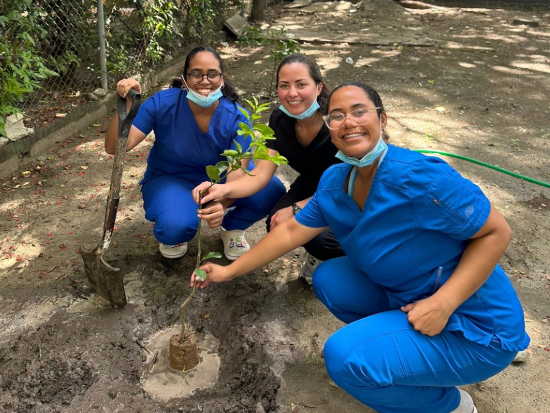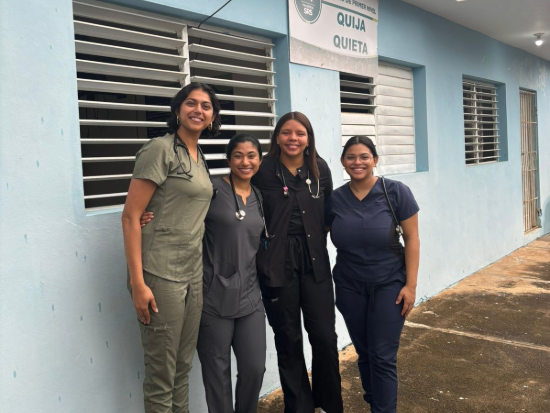The UAB Office of International Medical Education (IME) at the Heersink School of Medicine is proud to announce the launch of the Recognition of Distinction (RoD) in Global Health, an innovative program designed to empower future physicians to think globally, act locally, and lead boldly. Conceptualized by Majd Zayzafoon, M.D., Ph.D., MBA, professor of Medical Education and assistant dean for International Medical Education (IME), the program blends a global vision with community focus and aims to train compassionate physicians who excel clinically and lead transformative efforts in health equity. This initiative is integrated with the Heersink School of Medicine curriculum calendar, combining experiential learning with real-world impact to prepare UAB medical students to make lasting changes in healthcare and public service.
A distinctive feature of the RoD in Global Health is the IME-funded scholarships that will allow medical students to participate in international electives, immersing themselves in global medicine and the real-world application of the United Nations Sustainable Development Goals (UN SDGs). Students can travel to locations such as the Dominican Republic, Panama, Guatemala, and Zambia, gaining hands-on experiences and learning about health disparities, resource-limited healthcare delivery, and sustainable solutions. Through these experiences, they’ll gain insight into the meaning of SDGs like Good Health and Wellbeing (SDG 3), Quality Education (SDG 4), and Reduced Inequalities (SDG 10), understanding firsthand how these goals impact vulnerable populations around the world.
 “From underserved neighborhoods in Birmingham to rural clinics in Central America and Africa, healthcare challenges are interconnected,” said Zayzafoon. “This innovative program helps medical students understand and address those connections—because health equity knows no borders.”
“From underserved neighborhoods in Birmingham to rural clinics in Central America and Africa, healthcare challenges are interconnected,” said Zayzafoon. “This innovative program helps medical students understand and address those connections—because health equity knows no borders.”
Students will also have the opportunity to travel to locations in Bahrain, England, Japan, and Wales to participate in programs that teach new and innovative medical practices and research. Students can evolve this knowledge and experience through the scope of the UN SDGs, further developing the skills they bring to underserved communities.
By engaging in community health projects, clinical and research rotations, and international electives, students will build essential skills for providing patient care in resource-limited settings. Peer mentorship, peer education, and information sharing further enhance students’ ability to overcome global health barriers and create strategies to conquer them. RoD in Global Health seeks students passionate about service, with opportunities to explore the impact of SDGs and design evidence-based interventions. For example, collaborative projects on clean water access (SDG 6), hunger (SDG 2), and sustainable cities (SDG 11) will enable students to translate theory into actionable solutions.
A core element of the program is the Global Health Discovery Project, encouraging students to engage in research and innovation aligned with their interests. Ideally, students who participate in an international elective in their first year will continue their learning and research through their Global Health Discovery Project, and those who participate in their fourth year will use their opportunity to explore the focus of their project in a real-world environment.
“This is not just a program—it’s part of my lifelong vision for advancing global medical education at UAB, empowering future physicians to become leaders who improve lives locally and globally,” Zayzafoon said. “By aligning personal passion with meaningful action, students aren’t just learning—they’re advocating and discovering solutions that change lives.”
 In addition to the academic and research components, the program builds leadership skills, preparing students to become agents of change in global health policy and practice. By fostering a culture of discovery among students, the program aids in designing sustainable, community-based healthcare solutions that align with the vision of scalable public health impacts promoted by leading philanthropies.
In addition to the academic and research components, the program builds leadership skills, preparing students to become agents of change in global health policy and practice. By fostering a culture of discovery among students, the program aids in designing sustainable, community-based healthcare solutions that align with the vision of scalable public health impacts promoted by leading philanthropies.
“This program exemplifies the mission of the Heersink School of Medicine to produce healthcare professionals prepared to meet evolving challenges on both local and global fronts,” said Anupam Agarwal, M.D., dean of the Heersink School of Medicine. “It highlights our commitment to innovation and advocacy, while giving students the tools to drive meaningful improvements in health equity. Programs like RoD in Global Health are essential to fulfilling our vision of advancing education, research, and care on a global scale.”
To ensure meaningful outcomes, each student will maintain an online portfolio documenting clinical care, research and service activities, while also tracking key metrics such as student engagement, patient outcomes, and healthcare coverage improvements. This data-driven approach allows us to measure impact and refine program objectives continually. Regular mentorship and progress meetings with faculty provide structured guidance, helping students stay aligned with their goals. Upon completion, students undergo a final portfolio review to assess their growth and to award the distinction. The opportunity to share experiences on a collaborative platform will further inspire peers to engage in global health initiatives and foster a self-sustaining community of passionate leaders.
The Recognition of Distinction in Global Health was created to be more than just a program students participate in to check academic boxes. Whether through climate-resilient healthcare strategies or hands-on care in underserved communities, Heersink School of Medicine students will develop the skills to turn challenges into opportunities for change.
“This program is vital for our students’ growth, allowing them to engage with complex global health issues firsthand,” said Craig Hoesley, M.D., senior associate dean for Medical Education. “It provides invaluable experiences that deepen empathy and shape leaders ready to make a meaningful impact.” The program also teaches students to design healthcare solutions that are culturally sustainable. “Our graduates will be leaders who advocate for health equity and inspire others to do the same,” said Hoesley.
In launching this program, UAB Heersink School of Medicine reaffirms its commitment to the innovation and leadership in medical education. As healthcare challenges become increasingly interconnected, UAB aims to prepare leaders who will shape the future of global healthcare, aligning this program with like-minded philanthropies and organizations focused on scalable solutions for a healthier world.
“This program is a tremendous addition not only to the School of Medicine but to the entire UAB community,” said Janet Woodruff-Borden, Ph.D. Senior Vice President for Academic Affairs & Provost. “It reinforces UAB’s commitment to impactful, interdisciplinary education and prepares our students to bring innovative, inclusive solutions to healthcare challenges worldwide. This initiative exemplifies how UAB strives to foster leadership and service that resonate beyond our campus and into the global community.”
Through the Recognition of Distinction in Global Health program, students not only have the opportunity to further develop their clinical expertise, but also expand their perspective on a global scale. Whether in Birmingham or beyond, participants will drive sustainable change through research, care, and leadership—helping to advance equity and well-being for all.
For more information about the program, contact Victoria Patneaude with any questions at RDGH@uab.edu or visit the UAB International Medical Education webpage.